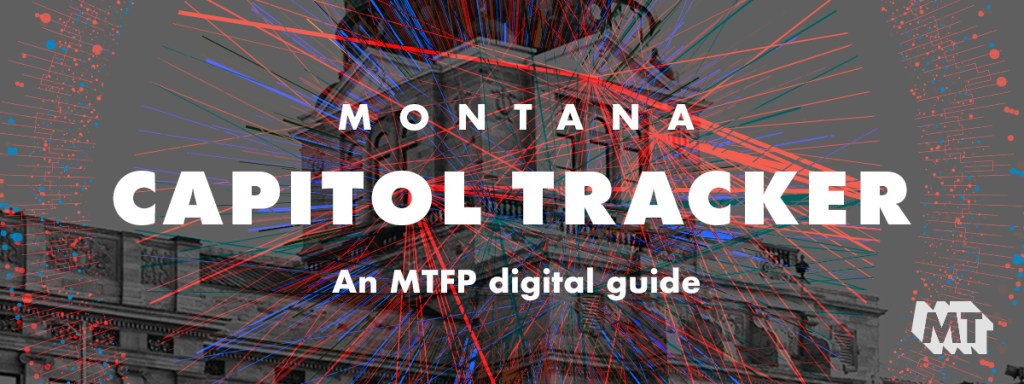HELENA — One of the more hotly debated pieces of voting rights legislation to appear before the Legislature in 2021 cleared the House floor this afternoon, passing on a predominantly party-line vote.
Senate Bill 169, sponsored by Sen. Mike Cuffe, R-Eureka, would revise election laws to require people without a state, military or tribal photo ID or passport to provide two forms of identification when they register to vote and when they vote at the polls. Those two forms would have to include one form of alternate photo ID, such as a student ID or a Costco card, and one additional form of identification such as a utility bill, bank statement, paycheck or government document with the voter’s name and address. In other words, eligible students who only have a school ID and want to vote would need to furnish a second document as well.
The bill also adds concealed carry permits to the list of allowable single-source voter identification.
A previous version of SB 169 would have required voters to supply a valid photo ID. That language was taken out. The provision requiring college students to produce two forms of identification was also removed earlier in March, but reinserted via amendment on the House floor this week.
Lawmakers tussled over SB 169 at that point, debating the pros and cons of stricter voter ID requirements. Supporters argued the new provisions would strengthen Montana’s election process and prevent negligent or fraudulent electors from undermining democracy. Rep. Barry Usher, R-Roundup, said identity confirmation for voters should be held to the same standard as for people buying cars, recreational vehicles or houses, which require multiple forms of ID. He added that the ease with which illegal immigrants can obtain a driver’s license raises the possibility of non-eligible voters being able to cast a ballot. Rep. Kerri Seekins-Crowe, R-Billings, cited her years of working for Delta Airlines when pointing out that the Transportation Safety Administration is currently stricter about ID requirements than Montana election law.

“What I appreciate about this bill is it actually is a bill about protecting our Montanans and Montana values, our Montana families and our Montana way of life,” Seekins-Crowe said.
Opponents continued to stress that SB 169, like several other election law changes proposed this session, stands to disproportionately disenfranchise students, the elderly and indigenous Montanans. Rep. Jessica Karjala, D-Billings, said some people simply don’t have the money to afford the required forms of identification and may not pay utilities under their own name for a variety of reasons. Karjala spoke to how elderly people could be negatively impacted by describing her mother-in-law, an extremely active voter who stopped driving years before her death, did not have a driver’s license, and paid utilities under her husband’s name. Rep. Jonathan Windy Boy, D-Box Elder, testified that in reservation communities, two or three families could be living in one household because “that’s what’s available.” Requiring two forms of ID including an electricity or telephone bill, he said, would be “another barrier” for people who are otherwise eligible to vote. Windy Boy also speculated that if SB 169 is signed into law, it will likely generate a legal challenge.
That was the concern of Rep. Geraldine Custer, R-Forsyth, as well. Custer said the amendment aimed at student voters undermined considerable work done by lawmakers, the governor’s office, the secretary of state’s office, the Montana Association of Counties and county clerks and recorders to address earlier issues.
“Putting this wording back in requiring the college students to have two forms of ID is discriminatory,” Custer said, “and it’s going to go right to court. And I think this flies in the face of conservative Republican principles that we’re going to spend hard-earned Montana taxpayers’ dollars to line the pockets of attorneys when we don’t need to do this.”
Custer was the sole Republican to vote no on SB 169 Friday afternoon. The full Democratic wing of the House also voted against the bill. The amended version now goes back to the Senate for consideration, where it passed on a party-line vote in early February.
latest stories
BLM to end new coal leasing in Powder River Basin
The agency’s decision comes amidst declining coal production nationally and moves by the Biden administration to curtail the power sector’s contribution to climate change.
What we know about the arrest of state superintendent candidate Sharyl Allen
How the recent arrest of Harrison School Superintendent Sharyl Allen ties to her Republican primary bid for state superintendent and to a state investigation into teacher misconduct.
Attorney General Knudsen accused of soliciting ghost competitor for campaign finance purposes
Incumbent Attorney General Austin Knudsen and his opponent in the GOP primary face political practices complaints following reports that Knudsen acknowledged recruiting an opponent so he could accept larger donations.
